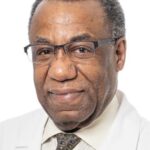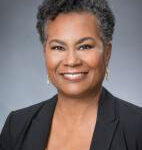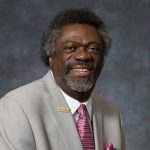February is Black History Month, an annual celebration of the achievements of Black Americans. We encourage everyone to take this month to celebrate and honor Black Americans, reflect on our nation’s history and the many contributions of Black Americans and to learn about the struggles Black Americans still face today.
For teammates at UNC Health and the UNC School of Medicine, we invite you to participate in one of the many events, panel discussions and activities planned by the UNC Health Black Alliance Employee Resource Group (ERG) in partnership with the UNC School of Medicine. Visit the intranet and watch our teammate newsletters for information on how you can participate.
Black History Month UNC Health Teammate Spotlights
In celebration of Black History Month, we asked some of our UNC Health teammates ‘What Does Black History Month Mean To You?” Here’s what they shared:
 Alicia Adams
Alicia Adams
Department: Center for Nursing Excellence
Role: Administrative Specialist
Years of Service: 3 years
Fun Fact: I’m a writer and currently working on two books. I have also performed in several plays as well as written and directed my own play.
What Does Black History Mean To You? Black History Month means STRENGTH! COURAGE! BOLDNESS! It’s an opportunity for the African American community to show up and show out! To be able to express ourselves in ways we may not be able to any other time of the year. Paying homage to our ancestors and remembering the “old ways” but also acknowledging those that are showing up today. Black History Month means WE’RE STILL HERE!’
 Deirdre L. Burton
Deirdre L. Burton
Department: Quality Management in McLendon Clinical Laboratories
Role: Medical Laboratory Supervisor
Years of Service: 17 years, 4 months
Fun Fact: If I won the lottery, I would probably still come to work because I enjoy the people I work with.
What Does Black History Mean To You? Black History to me means understanding my roots and reverencing those who paved the way sacrificing their lives, so that we could have a better life. It tells me that I’m great and that I can overcome obstacles, be successful and generate change. It means reaching my highest potential to be the best I can be and pay it forward. Despite the inequalities and the challenges that others impose upon me, the impact of African American culture is so much greater. The leadership and determination that was exhibited by MLK, Rosa Parks and so many others who took a stand and overcame the struggles, resonates with me daily. It reminds me to remain hopeful and to seek out opportunities to make a difference or to be the change. I, we, Black Americans, have an obligation and responsibility to continue to add our contributions that will advance the position of people of color and provide a better future for ALL people now and for those that follow. In the words of Martin Luther King, “If you can’t fly then run, if you can’t run then walk, if you can’t walk then crawl, but whatever you do you have to keep moving forward.”
 Jason Horn
Jason Horn
Department: Learning and Organizational Development
Role: Learning and Organizational Development Consultant
Years of Service: 8 years
Fun Fact: Loving father who is excited about being an recent empty nester while both children are away at college.
What Does Black History Mean To You? Black History Month is a time that we celebrate the innumerable contributions that our black brothers and sisters have made throughout history and continue to make today. It’s a time when we recognize and celebrate the impact that their contributions have had on the world. It’s an opportunity to shine the light on the contributions that many unsung historical Black figures have made over time, and it presents a chance to share that knowledge and increase the world’s awareness of it. Those contributions and their impact span across almost every aspect of our lives, and Black History Month has become a time that we focus on learning about the source of those contributions. It’s a time during which we celebrate the excellence of the Black community’s ancestry, an ancestry that deserves more recognition than it is often afforded, and an ancestry that should fill the Black community with a deep and true sense of pride.
 Orna Manison
Orna Manison
Department: School of Medicine – Surgery
Role: Administrative Support Supervisor
Years of Service: 1996 – 2001 (4 years) and 2007 – Current (14 years)
Fun Fact: I love classical music and I’m a diehard Pittsburgh Steelers fan. I played the viola for 15 years and was a part of a talented group of members and instructors in the All City Orchestra Program in Pittsburgh, PA. In this program, I had individual and group training sessions including writing music and performed at several events.
What Does Black History Mean To You? Black History reminds me of the struggles, perseverance, and succession of the people who have paved the way for others and me.
Black History Month Showcase
Throughout Black History Month UNC Health is celebrating current and former UNC Health Teammates and UNC Alumni who Lead the Way. Learn about these teammates and their contributions to science, healthcare and our community.

Kizzmekia Corbett, PhD
Pioneering Viral Immunologist Whose Research Led to a Vaccine for COVID-19
Kizzmekia Shanta Corbett, PhD is a research fellow and the scientific lead for the Coronavirus Vaccines and Immunopathogenesis Team at the National Institutes of Health (NIH), National Institute of Allergy and Infectious Diseases, Vaccine Research Center (VRC). She and her team worked with Moderna to develop the Moderna COVID-19 vaccine. Corbett began working in the lab at the University of North Carolina at Chapel Hill while a high school student in Hillsborough, through Project SEED. She earned a BS in Biological Sciences and Sociology from the University of Maryland-Baltimore County in 2008 and a PhD in Microbiology and Immunology from UNC-Chapel Hill in 2014. Corbett has worked at the NIH as a biological sciences trainer (2006- 2009), studied dengue virus in Sri Lanka as part of her dissertation research at UNC-Chapel Hill (2009-2014), and became a research fellow at NIH in 2014, where her specific focus is the development of vaccines for novel coronaviruses.
 Leroy Darkes, MD
Leroy Darkes, MD
Respected Physician with a Commitment to Serving Geriatric Populations
Dr. Leroy Scott Darkes is a physician in Raleigh, North Carolina. He is board-certified in internal medicine and is known for his expertise in geriatric healthcare. He is committed in both the clinical and educational aspects of being a community healthcare provider. Darkes was the long-time Community Medical Director for Rex Senior Health Center in Raleigh, which he helped to establish in 2004. He was appointed to the NC Minority Health Advisory Committee by Governor Mike Easley in 2004 and was awarded the Order of the Long Leaf Pine in 2018. Darkes is a graduate of Rutgers College and earned his medical degree from Rutgers University Medical School in 1982. He practices internal medicine at UNCG Internal Medicine at White Oak in Raleigh and is a provider in the UNC Senior Alliance Network.
 Laura Gerald, MD, MPH
Laura Gerald, MD, MPH
Leader in Addressing Social Determinants in Health Outcomes
Dr. Laura I. Gerald is President of the Kate B. Reynolds Charitable Trust, a position she has held since 2016, and an Adjunct Assistant Professor at the Gillings School of Global Public Health at UNC Chapel Hill. The trust works to improve the health and quality of life of North Carolinians, a goal shared by its leader. Gerald, a board-certified pediatrician, began her medical career as a pediatrician in her hometown of Lumberton.
She has worked as Senior Medical Consultant for Community Care of North Carolina, served as ED of the NC Health and Wellness Trust Fund Commission, oversaw statewide health policy as the NC State Health Director and the Director of the Division of NC Public Health, and worked as the Market Medical Director for Evolent Health.
 Ernest Grant, PhD, RN, FAAN
Ernest Grant, PhD, RN, FAAN
Renowned Burn Care and Fire Safety Expert
Dr. Grant is the first Black American man to lead the American Nurses Association. Dr. Grant has more than 30 years of nursing experience and is an internationally recognized burn-care and fire-safety expert. He previously served as the burn outreach coordinator for the N.C. Jaycee Burn Center at UNC. Dr. Grant is the first Black American man to earn a PhD in Nursing from UNC Greensboro. Watch this video to learn more about his journey to becoming the 1st male president of the American Nurses Association.